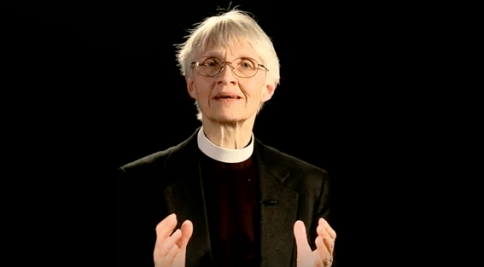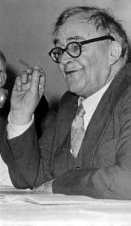Christmas is approaching. For those who are called to preach with Christmas, it means a time of (sometimes desperately) searching for creativity. How do you tell the very well-known story of Christ’s birth this time again? One option is of course to larder one’s sermon with all kinds of moving stories and anecdotes. That would not be my choice. On the contrary, in this post I will argue for a moment of reflection on the motivation for the Incarnation. Why did Christ came to us? Why was he born in Bethlehem?
The answer seems maybe obvious. The standard answer many of us would be inclined to give goes something like this: Christ had to come in order to save us. Take a look of your own Christmas sermons or those of others and you will find out that this is the basic scheme of nearly all of these sermons. That is, the motivation for the Incarnation is explained in terms of our fallen condition. In other words, this is an infralapsarian scheme. Last year I offered an example of such a sermon, from Karl Barth. No one will deny its truth and its worth in telling the story of Christmas. But is it the whole story? Asking this question means – in theological terms – asking whether Christ became man exclusively because of our sins. Would he have become man if the Fall had not occurred? Put differently (and less speculatively): can we offer other motives for the Incarnation, independent from our sinful condition? This is, of course, a supralapsarian take on the Incarnation. In the remainder of this post, I will offer two examples of this supralapsarian variation of the story of the Incarnation. Of course, these are offered by way of example, in order to point a direction, instead of fleshing out arguments.
 In her book Christ and Horrors. The Coherence of Christology (2006), the late Marilyn McCord Adams (1943-2017) defends the thesis that Christ’s mission is not so much saving us from our sins, but rescue us from horrors. Christ as our horror-defeater. Note that the motivation for the Incarnation here is indeed sin-independent, since McCord Adams holds that ‘horrors cannot have its origin in misused created freedom’ and that ‘humans were radically vulnerable to horrors fron the beginning, even in Eden’ (p. 36 – italics original). A Christmas sermon along these lines will posit Christ’s birth as a participation in our horrors. Moreover, it will not explain his participation in our horrors in terms of sharing our guilt, but in terms of sharing our situation by which we are ‘overpowered’. You might even want to go as far McCord Adams by suggesting that this is what God, as our Creator responsible for our vulnerability to horrors, owes us… Note, that McCord Adams’s proposal is indeed sin-indepent, but it is still ‘problem-driven’, the problem now being our vulnerability to horrors… Although I admire McCord Adams ingenious book, I am not completely convinced.
In her book Christ and Horrors. The Coherence of Christology (2006), the late Marilyn McCord Adams (1943-2017) defends the thesis that Christ’s mission is not so much saving us from our sins, but rescue us from horrors. Christ as our horror-defeater. Note that the motivation for the Incarnation here is indeed sin-independent, since McCord Adams holds that ‘horrors cannot have its origin in misused created freedom’ and that ‘humans were radically vulnerable to horrors fron the beginning, even in Eden’ (p. 36 – italics original). A Christmas sermon along these lines will posit Christ’s birth as a participation in our horrors. Moreover, it will not explain his participation in our horrors in terms of sharing our guilt, but in terms of sharing our situation by which we are ‘overpowered’. You might even want to go as far McCord Adams by suggesting that this is what God, as our Creator responsible for our vulnerability to horrors, owes us… Note, that McCord Adams’s proposal is indeed sin-indepent, but it is still ‘problem-driven’, the problem now being our vulnerability to horrors… Although I admire McCord Adams ingenious book, I am not completely convinced.
So, is there another variation available? Yes, I think so. Let’s consider a proposal from Edwin Chr. van Driel in his Incarnation Anyway. Arguments for Supralapsarian Christology (2008). In this monograph he develops  three arguments for a supralapsarian Christology, in conversation with Schleiermacher, Dorner, and Barth. One of his arguments is the Argument from Divine Friendship. My rendition here does not justice to the richness of his thoughts. However, it will hopefully serve to see the supralapsarian logic at work. ‘Friendship’, Van Driel says, ‘is motivated by a delight in and a love for the other’. Of course, he explains, friendships can be in danger, be under pressure, and so on. Friends, real friends, will look of course for reconciliation. However, that means that the wish for reconciliation is prompted by a deeper motivation: the longing for friendship, for community, for mutual love. That is what is at stake in the Incarnation. God is not merely solving ‘our problem’. His goal is friendship with us. This might sound rather familiar to you. Yet it could lead be translated into a rather different Christmas sermon. To illustrate what I have in mind, I can suffice with pointing to a sermon of Samuel Wells, which offers an eloquent illustration. Wells very convincingly points out that the heart of God’s reaching out for us can not be captured (only) in the word ‘for (God did this for me)’, but rather in the word ‘with’ (God wants to be ‘with us’). If you look for inspiration for your Christmas sermon along these supralapsarian lines, you might watch this video. Anyway, my Christmas sermon of this year will follow the trail set out by Van Driel en Wells.
three arguments for a supralapsarian Christology, in conversation with Schleiermacher, Dorner, and Barth. One of his arguments is the Argument from Divine Friendship. My rendition here does not justice to the richness of his thoughts. However, it will hopefully serve to see the supralapsarian logic at work. ‘Friendship’, Van Driel says, ‘is motivated by a delight in and a love for the other’. Of course, he explains, friendships can be in danger, be under pressure, and so on. Friends, real friends, will look of course for reconciliation. However, that means that the wish for reconciliation is prompted by a deeper motivation: the longing for friendship, for community, for mutual love. That is what is at stake in the Incarnation. God is not merely solving ‘our problem’. His goal is friendship with us. This might sound rather familiar to you. Yet it could lead be translated into a rather different Christmas sermon. To illustrate what I have in mind, I can suffice with pointing to a sermon of Samuel Wells, which offers an eloquent illustration. Wells very convincingly points out that the heart of God’s reaching out for us can not be captured (only) in the word ‘for (God did this for me)’, but rather in the word ‘with’ (God wants to be ‘with us’). If you look for inspiration for your Christmas sermon along these supralapsarian lines, you might watch this video. Anyway, my Christmas sermon of this year will follow the trail set out by Van Driel en Wells.

 prison (Strafanstalt) of Basel. This fact is surely important. From 1947 until 1954 Barth’s preaching activities were interrupted. But in 1954 he started preaching again more regularly. However, he restricted himself almost completely to the prison of Basel as his pulpit. These sermons have become famous because of their pastoral nature. The sermon for Christmas Day 1954, about Luke 2,10-11, offers abundant testimony to this quality.
prison (Strafanstalt) of Basel. This fact is surely important. From 1947 until 1954 Barth’s preaching activities were interrupted. But in 1954 he started preaching again more regularly. However, he restricted himself almost completely to the prison of Basel as his pulpit. These sermons have become famous because of their pastoral nature. The sermon for Christmas Day 1954, about Luke 2,10-11, offers abundant testimony to this quality.

